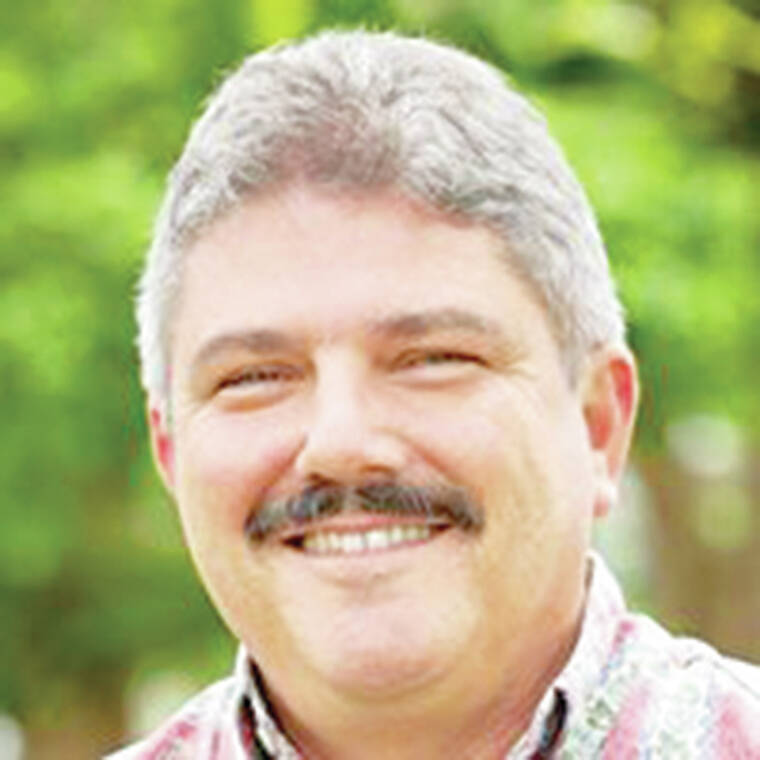LIHU‘E — In a Wednesday meeting, the new Kaua‘i County Council tapped member-elect Mel Rapozo to serve as chair for the next two years.
Rapozo — elected earlier this month after a four-year hiatus from the council — said he would provide checks and balances to the mayoral administration, give a platform for fair and open debate, and reengage the community in council meetings.
“Providing this venue for each one of us to have equal access and equal opportunity is really what’s going to drive the success of this council,” said Rapozo. “And that is my commitment to all of you.”
Rapozo was chosen unanimously by the new council, who all spoke positively about his past work.
First elected in 2002, Rapozo has spent the better part of the last two decades as a member of the County Council. He has served for 14 years, including four years as chair, from 2014 to 2018. He also spent 13 years with the Kaua‘i Police Department, and 21 years with the Hawai‘i Air National Guard.
He reached his term limit in 2018, and, after an unsuccessful bid for mayor, he has been working as a private investigator.
The chair is responsible for setting the council agenda and running meetings.
Council member KipuKai Kuali‘i was chosen as the vice chair, also by unanimous vote.
“My role as the vice chair would be to support the chair and support this council in every way that I can,” said Kuali‘i. “And everything that the chair has articulated about equal access, equal opportunity, checks and balances, those are all the same values and vision that I have.”
The new council also picked leaders for various committees, with most council members retaining their current positions:
Committee of the Whole: Rapozo
Finance and Economic Development: Luke Evslin
Housing and Intergovernmental Relations: Kuali‘i
Parks and Recreation/Transportation: Addison Bulosan
Planning Committee: Bernard Carvalho
Public Safety and Human Services Committee: Felicia Cowden
Public Works and Veteran Services: Billy DeCosta
Hawai‘i State Association of Counties representative: Bernard Carvalho
Hawai‘i State Association of Counties alternate representative: Billy DeCosta
HSAC alternate
Leadership positions were chosen without conflict or significant discussion — with the exception of the relatively minor Hawai‘i State Association of Counties alternate representative role, for which both council members DeCosta and Cowden campaigned. HSAC holds conferences of county officials throughout Hawai‘i and lobbies the state government to take up legislation.
Cowden touted her experience in state and local government, and the fact that she had enough time to commit fully to the role, while DeCosta referenced his leadership abilities.
“I traveled to HSAC on the Big Island with all of you. I remember distinctively lightening up the room,” said DeCosta. “I am a natural-born leader and people gravitate to me.”
DeCosta referenced an incident at that conference, when, as he was sitting at a table of county representatives, he saw Cowden sitting alone and invited her to join them. Cowden said she hadn’t been at the table because all the men had gone to smoke cigars, and she hadn’t been invited because of her gender.
“I don’t have to be part of the boys club,” said Cowden.
“Just because I don’t demand a lot of attention doesn’t mean I’m not able to get an idea across or that I can’t communicate,” she continued.
“The cigar thing — it was no disrespect to any council women across the state,” said DeCosta. “No other council woman was invited to the cigar session because we were down by the beach in complete darkness and there were about eight men and it didn’t seem fit to have a woman in that area. So we were actually acting out of gentlemanship.”
DeCosta also mentioned that Cowden had not attended a trip to the National Association of Counties meeting in Washington, D.C., to which Cowden responded that she couldn’t attend because she was unvaccinated, which led to her experiencing what she described as “two years of very unfair separation.”
Finally, DeCosta added he had contacted several of his cowboy council member friends to meet with her during another the HSAC meeting.
“That’s the kind of connections I have out there,” he said. “Is that correct, did you meet up with my cowboy friends?”
“That’s correct,” said Cowden. “It’s not central to this job, and I know my own people out there.”
Rapozo said he thought both were capable of handling the position.
“I’ve been on many organizational meetings and I’ve never seen the battle for HSAC alternate representative,” said Rapozo.
In a surprising turn, DeCosta decided to vote against his own nomination.
“I wanted to show you how much I respected you, that’s why I voted against myself,” said DeCosta.
But he still won the role, as Rapozo, Kuali‘i, Bulosan and Carvalho voted in his favor. Cowden said the vote continued a pattern of her being treated as a “second-class council member.”
“I am really disappointed,” said Cowden. “I know it’s not that important of a position, but it tells me a direction. It tells me the direction that I’m going to be facing another two years of what I will honestly say is male discriminatory behavior.”
After leadership roles were chosen, the council took up several of Cowden’s suggestions for rule changes, with some amendments.
The time council members are allowed to speak on any agenda item was extended from five minutes to eight minutes, a suggestion was added that calls for council members to submit documents on their community outreach when they submit a bill, and the chair was granted authority to allow members of the public to give their six minutes of testimony continuously rather than in three-minute increments.
•••
Guthrie Scrimgeour, reporter, can be reached at 808-647-0329 or gscrimgeour@thegardenisland.com.


